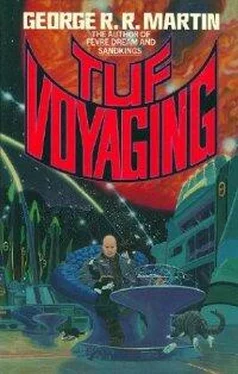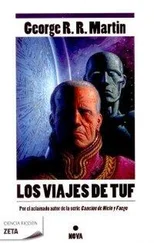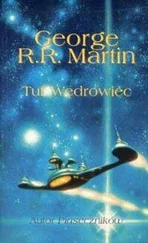But Jaime Kreen suddenly felt very cold. And he did as he was bid.
Moses was a tall, strong man, but Tuf had told Jaime Kreen of his nightly reflections, and it was an easy enough thing to wait one evening in the hills beyond the village, in the brush with three others, and overcome Moses as he passed. One of Kreen’s assistants suggested killing the Altruistic leader then and there, but Kreen forbade it. They carried the unconscious Moses back to the waiting Griffin , where Kreen dismissed the others.
Shortly after, Kreen delivered Moses to Haviland Tuf, and turned to take his leave.
“Stay,” Tuf said. They were in a room that Kreen had never seen before, a vast echoing chamber where the walls and ceiling were of the purest white. Tuf was seated in the center of the chamber, at a horseshoe-shaped instrument panel. Dax sat atop the console, looking quite alert.
Moses was still groggy. “Where am I?” he demanded.
“You are aboard the seedship Ark , the last functioning biowar ship of the Ecological Engineering Corps. I am Haviland Tuf.”
“Your voice,” Moses said.
“I am the Lord God,” Haviland Tuf said.
“Yes,” Moses said. He stood up suddenly. Jaime Kreen, standing behind him, grabbed him by the shoulders and shoved him roughly back into his seat. Moses protested, but did not try to rise again. “You were the one who brought the plagues, the voice from the pillar of fire, the devil who impersonated God.”
“Indeed,” said Haviland Tuf. “Yet you misunderstand. You are the impersonator in this company, Moses. You sought to impersonate a prophet, to pretend to vast supernatural powers you do not have. You employed tricks, and waged a primitive form of ecological warfare. I, in contrast, am no pretender. I am the Lord God.”
Moses spat. “You are a man with a starship, and a host of machines. You played the plague game well. But two plagues do not make a man a god.”
“Two,” said Haviland Tuf. “Do you doubt the other eight?” His large hands moved over the instruments before him, the room darkened, the dome ran with light, and it seemed they were out in space, looking down on Charity. Then Haviland Tuf did something else to his instruments. The holograms shifted and they were moving, sinking, soaring, until the blurs resolved themselves. They floated above the settlements of the Holy Altruists, in the Hills of Honest Labor. “Watch,” commanded Haviland Tuf. “This is a computer simulation. These things were not, yet could have been. I am confident that you will find this enlightening.”
In the domed room, all about them, they saw the villages, and shadow-faced people moving among them, shoveling the carcasses of dead frogs into pits for burning. They saw within the cabins, too, where weaker people burned with fevers. “It is after the second plague,” Haviland Tuf announced, “even as now. The bloodfrogs have spent themselves.” His hands moved. “Lice,” he said.
The lice came. The dust itself seemed to burst with them, and suddenly they were everywhere. All the shadow-folk were scratching, and Jaime Kreen (who had scratched a good bit himself before departing for K’theddion) chuckled. Then he stopped chuckling. The lice seemed more than lice. The people broke out in a scarlet rash, and many of them took to bed, screaming of the itches, the horrible itches. Some scratched themselves so badly that they drew blood, scratched deep gouges in their skin, and tore their fingernails loose in their fury.
“Flies,” said Haviland Tuf. And the flies swarmed, flies of all kinds—the swollen stinging flies of Dam Tullian, the flies of Old Earth with their ancient diseases, the black and grey fleshflies of Gulliver, the sluggish flies of Nightmare who plant their eggs in living tissue. They settled on the villages and the Hills of Honest Labor in immense clouds, and covered them as if they were but a particularly large dung heap, and left them black and thick and stinking.
“The murrain,” said Haviland Tuf. They watched the herds die by the thousands. The gross immobile meatbeasts in the cellar of the City of Hope turned to rot and corruption. Burning could not check the pestilence. Soon, no meat was left, and those people who still lived grew gaunt and bitter-looking. Haviland Tuf said other words—anthrax, Ryerson’s Disease, roserot, calierosy.
“Boils,” said Haviland Tuf, and again disease raged, but this time among the people and not their animals. They sweated and screamed as the boils covered their faces and hands and chests, each swelling until it burst, so the blood and the pus ran free. Then new boils grew as fast as the old ones vanished. Men and women staggered through the streets of the simple villages, blind and pockmarked, bodies crusted and covered with open sores, the perspiration running like oil over their skin. When they fell in the dirt, among the dead flies and lice and cattle, they rotted there, with none to bury them.
“Hail,” said Haviland Tuf, and it came, a great thundering pounding hail, the stones fists of ice, for a day and a night and a day and a night and a day and a night, and on and on, and fire mingled with the hail. Those who went outside died, the hailstones smashing them to the ground. And many of those who stayed within died, too. When the hail had stopped at last, there was hardly a cabin left standing.
“Locusts,” said Haviland Tuf. They covered the earth and the sky, clouds of them, worse than the flies. They landed everywhere, crawled over the living and the dead both, and ate what little food was left, until there was nothing at all.
“Darkness,” said Haviland Tuf. Darkness moved. It was a gas, a thick black gas, drifting with the wind. It was a liquid, flowing, moving like a sensuous stream of jet, gleaming, shining. It was silence. It was night. It was alive. Where it moved, no life remained behind it; the weeds and grasses were dry and dead, and the soil itself looked raw and ravaged and bruised. It was a cloud larger than the villages, or the Hills of Honest Labor, or the locusts. It settled over all of them, and nothing moved for a day or a night, and then the living darkness rolled on, and behind it was only dust, and dry decay.
Haviland Tuf touched his instruments, and the visions were gone from them. The lights came on again. The walls were very white.
“The tenth plague,” Moses said slowly, in a voice that no longer seemed rich or large. “The death of the firstborn.”
“I admit to my own failures,” said Haviland Tuf. “I cannot make such fine distinctions. I would point out, however, that all of the firstborn are dead, in these scenes that never were, even as the lastborn. I am a gross and clumsy god in that; in my awkwardness, I must need kill all.”
Moses was pale and broken, but within him was still a strong and stubborn man. “You are only human,” he whispered.
“Human,” said Haviland Tuf, in his voice without emotion. His huge pale hand was stroking Dax. “I was born human, and lived as such for long years, Moses. Yet then I found the Ark , and I have ceased to be a man. The powers I may wield are vaster than those of many gods that humans have worshipped. There is not a man I meet but I could take his life. There is not a world I pause on that I could not waste utterly, or remake as I choose. I am the Lord God, or as much of one as either of you is ever likely to encounter.”
“It is a great fortune for you that I am kind and benevolent and merciful, and too frequently bored. You are counters to me, nothing more—pieces and players in a game with which I have whiled away a few weeks. It seemed an interesting game, this plague business, and so it was for a time. Yet it quickly grew dull. Even after two plagues, it was clear that I had no meaningful opposition, that you, Moses, were incapable of anything that might surprise me. My objectives were accomplished—I had taken back the people of the City of Hope, and the rest would be meaningless ritual. I have elected instead to end it.
Читать дальше












